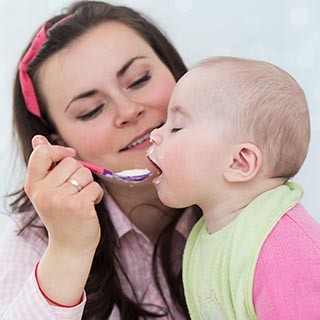Infants
Infants

An infant is also called a baby. Infancy is the period of life from birth and one year of age. Infancy is one of the shortest stages of life. Infancy and adolescence are the two stages of life in which a lot of growth occurs.
- During infancy, nutritional needs are higher per unit of body weight than at any other time in a person’s lifespan.
- An infant doubles his/her body weight in the first six months of life.
- By the time a baby turns one year old, he/she will have tripled his/her weight, and height will have increased by 50 percent.

Nutritional Needs During Infancy:
Calories: The amount of calories (energy) an infant needs for activity varies. Infants need more calories as they become more mobile.
- The stomach of a newborn is small and can only hold 1-2 ounces at each feeding.
- The best diet for infants is high fat/low carbohydrate.
Protein: needs are highest during infancy.
- 0 to 6 months : 9.1 grams of protein
- 7 to 12 months: 11 grams of protein
Carbohydrate:
- 0–6 months: 60 grams per day
- 7–12 months: 95 grams per day
Fat: Fat supplies approximately 50 percent of the energy for an infant (supplied by breastmilk and formula).
- 0–6 months 31 grams per day
- 7–12 months 30 grams per day
Vitamin D: Vitamin D is important for bone development. Infants who are breastfed but do not receive supplemental vitamin D, or enough sunlight exposure, are at increased risk of vitamin D deficiency.
- 0–12 months 5 micrograms per day
Iron: This mineral is needed for proper growth and formation of healthy blood cells. It also helps prevent iron-deficiency anemia. Full-term infants are born with stores to last for up to 4-6 months of age.
- Adequate Intake for Infants 0 - 6 months: 0.27 mg/day
- RDA for Infants 7 - 12 months: 11 mg/day
Water: During infancy, water is supplied through breast milk, infant formula and some solid foods. Too much water can be dangerous since it can lead to water poisoning. A few things water is important for in infancy are:
- Regulate body temperature
- Maintain kidney function
- Transport for nutrients and waste products

Infancy Concerns: Some things to be aware of during this life stage are:
SIDS: Sudden infant death syndrome (SIDS) is the unexplained death of a baby under the age of one, usually during sleep. SIDS is sometimes known as crib death because the infants often die in their cribs. Cause is unknown.
Some factors that seem to put babies at a higher risk:
- Sleeping on the stomach or side.
- Sleeping on a soft surface. Lying face down on a soft mattress, fluffy blanket or a water bed can block an infant's airway.
- Sharing a bed.
- Overheating.
Prevention Tips:
- For the first year place your baby on its back to sleep
- Use a firm mattress and keep crib as bare as possible.
- Do not overheat the baby.
- If possible have the baby sleep in your room, in a crib or basinet.
- Breast feed the baby if possible.
- Offer a pacifier without a strap/string.

Dehydration: Dehydration, excessive loss of water from the body, in infants can lead to death. These are some signs of dehydration:
- A reduced amount of urine (dark yellow in color).
- Dry membranes in the mouth.
- No tears when crying.
- Sunken eyes.
- Restlessness, irritability or lethargy.
Bottle Safety: Whether you are using a bottle for pumped breastmilk or using formula, it is important to keep certain things in mind:
- Clean and sterilize bottle parts and nipples in a dishwater with hot water and a hot drying cycle, or wash them with hot soapy water. Then, place them in a pot and cover them with water and boil for five minutes.
- If using powdered formula, mix it with the water after five minutes of boiling.
- Check the temperature before feeding the baby by sprinkling a few drops on your arm.
- Throw out anything left in the bottle after each feeding or within one hour, do not save it for the next feeding.


 TARRANT COUNTY, TX
TARRANT COUNTY, TX

 Chronic Disease Prevention
Chronic Disease Prevention